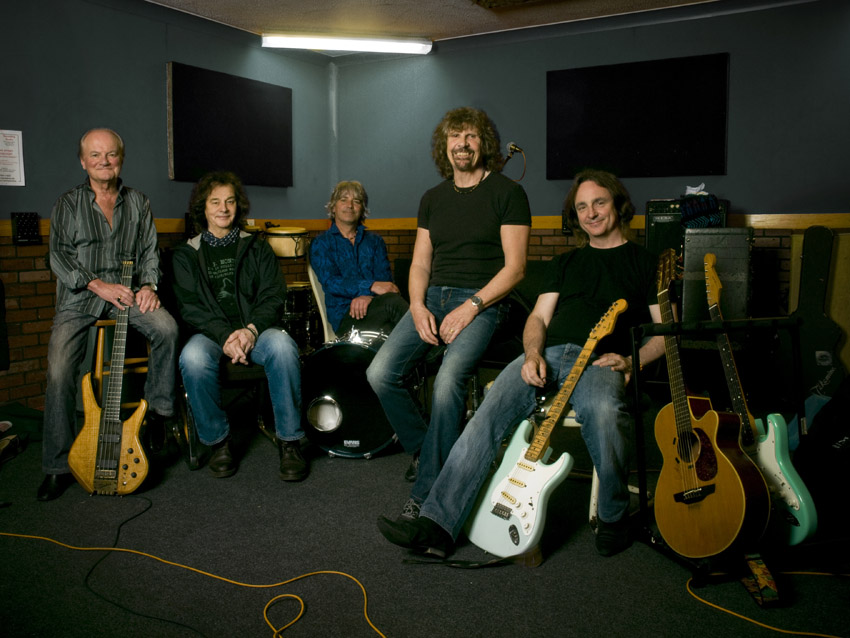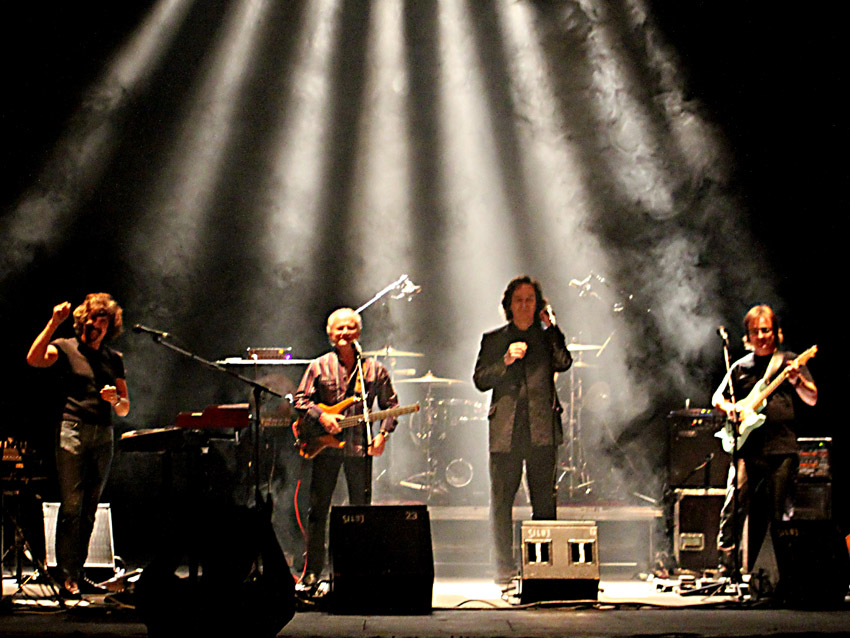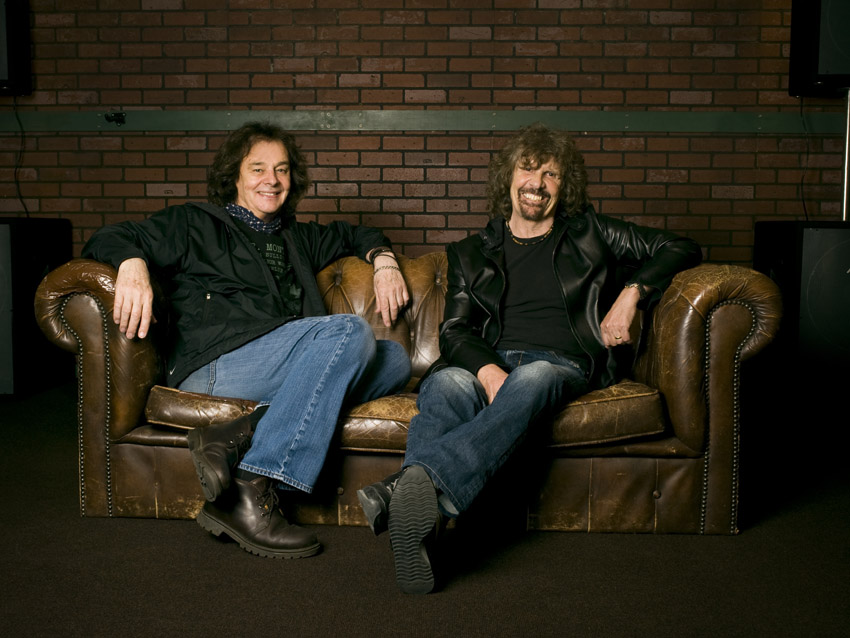Interview: The Zombies' Rod Argent and Colin Blunstone
The psych-pop lynchpins talk new album, 50th anniversary and touring Odessey & Orade

The Zombies

The Zombies

The Zombies

The Zombies' Colin Blunstone (l) and Rod Argent (r) © Leo Cinicolo
When the original line-up of The Zombies reconvened in 2008 to mark the 40th anniversary of their classic album Odessey & Oracle, few fans who packed concert halls across Europe and America could have predicted the exercise would lead to a new lease of life for the band.
Creative lynchpins Rod Argent and Colin Blunstone had made just one record together since the start of the decade, and had for a long time resisted performing more than a handful of songs from their past, reluctant to trade on former glories.
Painstakingly replicating every note and harmony from O&O changed all that, however. Bowing to pressure from longtime devotees of the band, the work ethic involved in bringing a landmark psychedelic pop album to the live stage energised Argent and Blunstone, and both admit it reignited their passion for making music.
Subsequently, their new release Breathe Out Breathe In is already being hailed as the second-best record of their lengthy career (2011 marks the 50th anniversary of the band's formation).
Though never scaling the dizzy heights of some of their 1960s contemporaries, The Zombies remain a much cherished band who have more than earned their place in rock's rich history. Certainly, hits such as She's Not There and Time Of The Season have endured, the former recently introduced to a new generation of music fans after it featured in an episode of the TV phenomenon Glee.
The new album is persuasive evidence that The Zombies are more than just nostalgia merchants, but by revisiting their most critically acclaimed back pages they've found the momentum to move forward. MusicRadar spoke to both Argent and Blunstone about their past, present and future.
Want all the hottest music and gear news, reviews, deals, features and more, direct to your inbox? Sign up here.
Breathe Out Breathe In isn't exactly Odessey & Oracle Mk II, but would you agree that the two albums have some shared DNA?
Colin: "I wouldn't say we've tried to copy what went before, but I think playing O&O again made a lasting impression on us, how warmly received those concerts were. I think the new album has a flavour to it, an attitude that we had all those years ago.
"Rod and I had previously done our best to look away from the past, to always try to do something different, but I think the success of the shows led to us being less afraid of referencing the past."
Rod: "In an indirect way it's probably given us more focus in the studio. More and more we began to inhabit the frame of mind we had when we first set out together in the '60s. We wanted to avoid making O&O II, but when we were listening back to the new album we noticed there were some real resonances of our early stuff.
"Specifically, I think what playing O&O did for me was to get me interested in exploring harmonies again, that became part of my brief when we started making the new album.
"I also wanted all the songs to be reasonably concise, I didn't want them to ramble on, they had to be structured in such a way that they got the job done without overstaying their welcome.
"O&O was a very brief album, largely because it had to be - 40 minutes was about the limit when it came to vinyl records. So many albums I buy these days are way too long, there's always the temptation to fill a CD with 75 minutes of music because the technology allows it, but I often find myself getting as far as Track 10 and thinking 'that's enough'."
When the two of you started working together again extensively in 2000, the idea of playing an old album in its entirety was far from your minds. How did you finally arrive at the decision to revisit it?
Rod: "I did a one-off charity show for the jazz musician John Dankworth, the first time I'd played live in years, and Colin was part of that as well. Afterwards, we got talking and decided to do about half a dozen gigs together, we really didn't plan on doing any more than that, but it's been 10 years now!
"I always resisted reforming The Zombies because I never wanted to be part of the nostalgia circuit. I've been lucky that writing royalties have meant a good income down the years without me worrying too much about how to make a buck and needing to go out on a golden oldies tour to put food on the table. Having money gave me the freedom to follow my heart. I was funding our first two or three years of operations, but I think it was money well spent."
Colin: "The original idea was for us to do shows just as Argent & Blunstone, but we kept finding ourselves billed as The Zombies when we arrived at venues. We did fight it to start with, and perhaps that was wrong of us. We ultimately realised that there were a lot of people out there who wanted to hear Zombies songs; we were only doing three or four in our set but the audience were shouting out for others.
"So, we started exploring the back catalogue, even dusting off songs that the original band had never played live. I suppose that's where the germ of the idea to do the whole of Odessey & Oracle came from. There were a lot of songs that we couldn't play live at the time the album came out, because the technology wasn't as good in terms of concert performance - and there were an awful lot of overdubs on the record. But we started to think more and more about what it would be like to perform those songs on stage."
Odessey & Oracle has often been referred to as The Zombies' own Sgt Pepper. Would you agree with that?
Rod: "I can see why people might think in those terms, but it wasn't intended as such. You have to remember that we hadn't heard Pepper when we started the album, although we did have the honour of using the same studios.
"We were the first non-EMI act to ever record at Abbey Road. Our engineers were Peter Vince and Geoff Emerick, who'd just finished Pepper, and they brought a lot of the same recording techniques with them to our sessions. We'd never had the opportunity to do overdubs in the past, our earlier records were always made very quickly, so I was like a kid in a sweet shop.
"Playing O&O live in recent years made me fall in love the Mellotron all over again, which is why it features on the new album, but I think recording O&O was the first time I ever used one - because The Beatles had left it behind in the studio! It's the very same one that was used on Strawberry Fields Forever."
Did the album's initial lack of success play a part in the band splitting up?
Colin: "Possibly, because it really didn't make any waves at all when it came out. It got one or two good reviews, but it wasn't the commercial success we thought it would be. It didn't even chart in the UK.
"But it's taken on a life of its own over the years, which can only be through word of mouth. It's sold steadily for a long time, without causing any major ripples, which I must admit I'm still a little puzzled about. I don't think many albums have had such a lifespan without being a chart success anywhere or at any time."
It made greater inroads in the US, but it took some time, didn't it?
Colin: "Time Of The Season became a big hit in America, but that was over a year later, by which time I'd changed my name to Neil MacArthur and was embarking on a solo career.
"That was an odd period for me; I'd all but given up on a music career and was working in an office, but the success of Time Of The Season led to lots of offers, and I ended up re-recording She's Not There as my debut solo single. I hadn't really let go of the past, it would seem.
"My producer Mike Hurst, who'd worked with Cat Stevens on his early hits, suggested the name change. At one point I was going to be James MacArthur, until we learned that was the name of the actor who played Danno in Hawaii Five-O!"
But although the band was inactive, the two of you maintained a relationship down the years.
Colin: "Yes, Rod and The Zombies' bassist Chris White produced my 1971 album One Year, by which time I'd reverted back to my own name. Rod also had a hand in getting me to work with Dave Stewart on What Becomes Of The Broken Hearted [a Top Ten hit in 1981].
"Dave had recorded it with another singer but he felt it didn't work out properly. Barbara Gaskin, who sang on Dave's version of It's My Party, suggested me for the job - her sister was in the same year as me at school in Hatfield. Dave then got my number from someone in Rod's instrument shop in Denmark Street, where he used to buy all his keyboards."
Rod: "Immediately after The Zombies split up I started working with my own band, Argent. It was a heavier sound, more in keeping with the rock groups of the early '70s, but I think it was a natural progression from what went before, very much how The Zombies would have sounded had we stayed together."
The new album does appear to touch base with other periods of your history, not just O&O. One song, Shine On Sunshine, originally appeared on an Argent album.
Rod: "I wanted to revisit that song and change a few things. I've changed the chords, written a completely new middle eight, and changed a lot of the lyrics as well. It was a song I always felt was half-finished, and it's only now, when I hear it sung by Colin, that I think it's anywhere near what I originally had in mind all those years ago.
"I don't think Colin has ever sounded better, I think there's a new richness to his voice, which is also why I wanted us to have another crack at the old Zombies tune Christmas For The Free. It's close to the original, but more polished now. I think it suffered from being put together in a hurry in its first incarnation."
It's 50 years since you first performed as The Zombies. What are your memories of those early days.
Colin: "For a long time we were just a little local band playing around St Albans and Hertfordshire. We had a good following, but it was very parochial. Things only started to happen in 1964 when we won a talent contest, which led to us being signed to Decca Records."
Rod: "I think I'm right in saying Decca offered us a deal before the final. The recording contract was supposed to be the big prize for the winners, but they signed us after the semi-final, which really gave us the confidence that we actually might be able to make a go of music as a full-time career."
But you probably never thought you'd still be doing it 50 years later...
Rod: "Absolutely not! Back then nobody really thought further than 18 months ahead, two years at the most. I think it's an enormous privilege to be still making records after all this time, and for there to be new paths opening up for us.
"I tend not to look back, as I said earlier, but it's hard for any musician not to compare what they're doing now to what's gone before, and I think this new album is the best thing I've been involved with for years. I really feel in some ways that we're just starting out."
Breathe Out Breathe In is out now on Red House Records. The Zombies' 50th anniversary tour begins on 14 May, full details at thezombies.net.